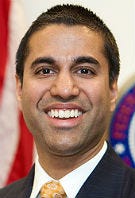Analysts Weigh Pros, Cons Of Net Neutrality EndAnalysts Weigh Pros, Cons Of Net Neutrality End
In December, the Federal Communications Commission voted 3-2 in favor of repealing net neutrality.

Net neutrality is officially dead, but that doesn’t mean efforts have ceased to resuscitate the 2015 rules that prevented internet service providers (ISPs) from charging extra for, or slowing access to, particular content.
In December, the Federal Communications Commission voted 3-2 in favor of repealing the rules, a big win for companies such as AT&T, Verizon and Comcast that control much of the residential internet landscape.

FCC’s Ajit Pai
FCC Chairman Ajit Pai led the Commission’s initiative to end the regulations, saying that they stifled innovation and competition.
Jason Blackwell, IDC’s research director of consumer multiplay and SMB telecom, tells Channel Partners the most likely parties to suffer from lack of regulation will be consumers and smaller, nascent content providers that might not be able to pay for enhanced access.
“U.S. broadband customers already face a market where there is little competition, as many areas are served by only one ISP,” he said. “In other cases where both cable and telco internet service is available, cable operators typically offer much higher speeds, making the telco offer less enticing.”
Both telcos and cable operators have been investing in fiber, and large and small cable operators have upgraded their networks to DOCSIS 3.1, increasing the available speeds in many areas, Blackwell said. At the same time, broadband average revenue per user (ARPU) has continued to increase, so customers are paying more and, in some cases, getting more, he said.
“But what will happen with the end of net neutrality?” he asked. “Will ISPs really be willing to invest more, or will they just reap the rewards of paid fast lanes from charging content providers to deliver their content, while also increasing customers’ monthly bills? It’s not clear how or if this will lead to increased investments and enhanced end-user satisfaction.”
There also are customer-service issues to consider as broadband service providers potentially could slow down traffic from certain providers, Blackwell said. As the primary point of contact, the ISP will certainly face increased customer-service calls from upset consumers if they aren’t receiving the speeds they have paid for, he said.
“These calls are expensive, and customer satisfaction for ISPs, based on net promoter scores, is already extremely low according to our most recent consumer survey results,” he said. “Customers will be unlikely to blame third parties like Netflix for poor streaming experiences, when they believe that the broadband service is the real problem.”

Stratecast/Frost & Sullivan’s Michael Jude
However, Mike Jude, Stratecast/Frost and Sullivan research manager, said it’s important to remember that for most of the existence of the internet, there was no net neutrality, and none of the “horrible” things that people said would happen ever materialized.
“A lot of the issues that people bring up as a requirement to have net neutrality are really addressable with existing laws addressing antitrust, anti-competitive behavior, that sort of thing,” he said. “There are certainly alternatives to telecom regulations. I tend to subscribe to that. There are plenty of alternatives for content providers seeking redress there.”
If an ISP is out there discriminating against others’ content, that’s simply reducing the value of the connection, so people will seek alternatives, Jude said.
In addition, net neutrality created uncertainty in terms of companies continuing to invest in infrastructure, he said.
“So simply having net neutrality reduces incentive to provide broadband infrastructure in more rural areas,” Jude said. “This could lead to more investment of infrastructure, which is better for everybody.”
In the meantime, the fight to restore net neutrality continues. According to advocacy group Fight for the Future, more than 20 state attorneys general have filed lawsuits, and state legislation has been filed in more than 30 states by both Democrats and Republicans.
Read more about:
AgentsAbout the Author
You May Also Like


